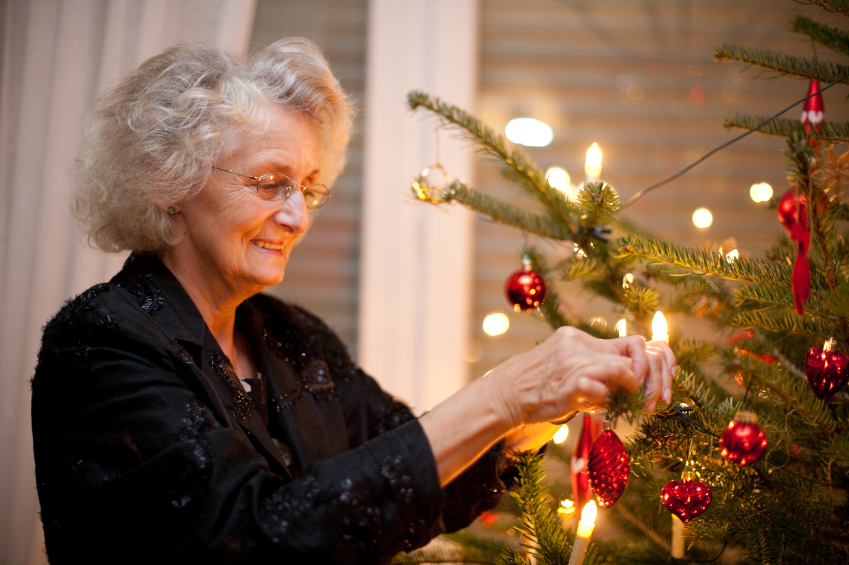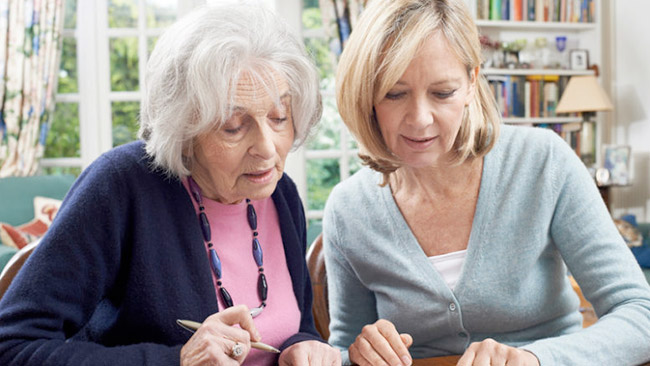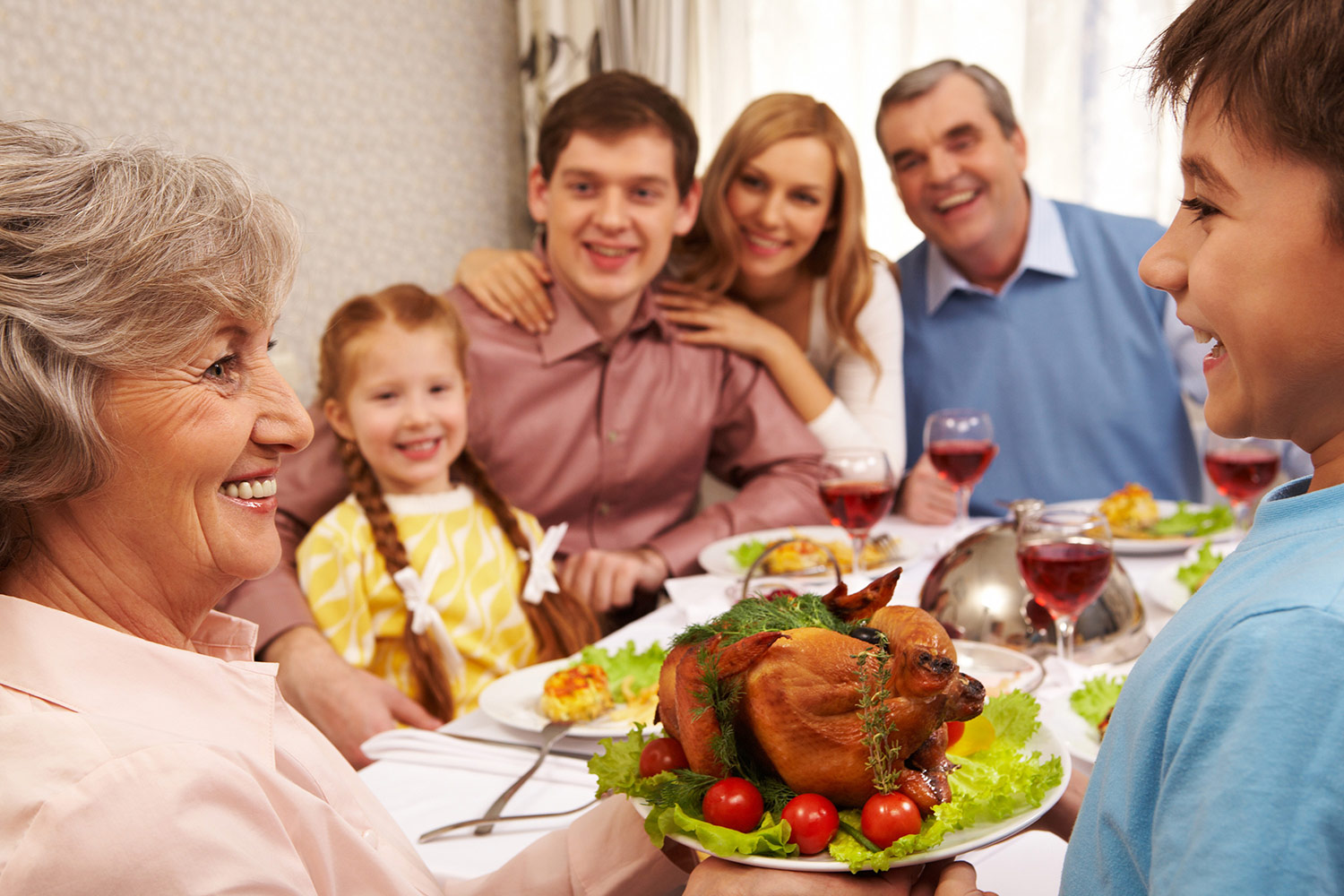– And welcome back to everyone to Answers for Alders Radio Network. And we’re here during the holiday season here in the Pacific Northwest with Kelley Smith, vice president of Marketing and Sales for CarePartners Senior Living, who specializes in Alzheimer’s and dementia care. And we’re talking about how to make the holiday season better when dementia or Alzheimer’s is involved. So many of us have loved ones – maybe you’re on your way to a family gathering, or you’re gonna go visit a loved one, and there may be some challenges, like how do I deal with this person? What do I do, and how can I facilitate the best communication possible? So Kelley, fill us in about the first tip.
– The first tip they talk about is Smaller, Simpler, Shorter. And you gotta keep in mind sometimes, we think every get together with our family. I mean, I have a friend right now and I don’t know how she does it. I’d slit my wrists, but I’m just I’m saying, it’s insane. You’ve gotta have special vegetable trays for the children, and we have to have – No, you don’t, you don’t. And so sometimes if we’re gonna try to bring our elderly folks home for the holidays, slow it down a little bit. You can keep it simple. Sometimes it’s about the company, it’s not always about the food and everything that you’ve put together. Enough is enough. You don’t have to go crazy. But sometimes keeping it a little bit simple and even shorter. I think sometimes people think that, we kept it simple, but mom and dad are gonna be a here all day. Maybe no, maybe two or three hours is about all they could handle. And shorter visits are also good. So that’s some pretty good advice from her on the first step is shorter, smaller, simpler.
– And what you’re saying with that is so true, because when I was caring for my mom, I had this philosophy of even though I was a burned out caregiver, and working a full time job on top of it, and I felt my whole life slipping apart. It’s like I knew the holidays were important to my mother when I was growing up, and so I bent over backwards to give her a wonderful Christmas celebration. And that included taking her to the Swedish Club so that she could have lutefisk. That included making sure that she got to all these places. And I know she was worn out. She was probably glad to a certain degree to take care of me. But I think I just put way too much stress on myself and upon her. And I think that’s one of the things that family caregivers try to do. They think, this might be mom or Dad’s last holiday. I don’t know if they’re going to be around next year, so I better do it up right, quote unquote. That’s the philosophy that a lot of people have, but I don’t think is the real expectation of a loved one. And I think that’s where we get mixed up, don’t you agree, Kelley?
– Absolutely. I’ve always said I’d rather break bread with friends than eat wagyu with strangers. Okay, right, it’s not about the meal, it’s about the company. The best times in my life were spent just with the people, I don’t remember the food. Your kids are growing up, and we’ll get together for days off, and family gatherings. I can’t tell you what we ate, but I can tell you who was there. I think that’s what you guys have to keep in mind too, is do you want to build memories for the grandkids about grandma and grandpa being there, or are you more worried about that turkey being absolutely perfect? And that’s your focus, and now you’re mean and hateful of the party because you didn’t get a chance to also sit and enjoy your family while they were there. I had gone to things before were I never saw the host, almost the whole night, because they were in there cooking.
– Yeah, well that was me. That was me.
– Well that’s great, but you’re part of that too.
– Yeah, it’s true. I was the worst. I was over the top. There were times that I just thought that I could do something, in a good way for my mom, but I didn’t really understand specifically at the time what was most important to her. And you’re right, it was being around her family.
– Your heart was in the right place. You were just trying to make her happy. And that’s what all families are really trying to do. We want mom and dad around. We’d like to see grandpa, and it matters to us, and their heart’s in the right place. But again, at the end of the holiday, or your time together, do you want to look back on this and go, man, what a mess? Or go, wow, we did we did good. This was awesome.
– And and I think on top of that, I’m going to add one more thing: ask for help. You don’t have to do it all. Maybe what you do is you have a pot luck, when you bring the family together. You don’t have to do it all. Start with little things like that, to make sure that you are aware that you can downsize things, you don’t have to decorate the entire house. Maybe you do a nice tree, and maybe you do some flowers and candles on the table, and that’s enough. You don’t have to go overboard. And I think that’s one of the things that we tend to do that are caring for loved ones, is we tend to overdo it. And it’s difficult. So what’s number two, Kelley?
– Number two that they have on the list here: Use Retained Abilities. Again, you have to remember, mom and dad haven’t forgotten everything. We have residents that couldn’t tell you their name, but they know how to fold socks. They still know how to help set the table. There’s some things that are what we call muscle memory, and things like that, that we just know how to do. It’s amazing. My grandfather could probably tear a car apart, but he couldn’t tell me what he had for breakfast. But what I’m getting at is, while mom and dad are there, instead of just putting them in a chair by the window, give them something to do that is a retained ability. If they can still sit with the kids and put puzzles together, let them do that. If they want to help set the table, let them help.
– Sing carols. It’s amazing what music does. Turn on Christmas songs.
– Also, you have to remember too, what is dementia? Part of dementia is feeling like you no longer fit in and you’re no longer needed. That’s another big thing that people with dementia deal with. That’s part of the process. So, if mom and dad are at the house, and you could use a little help, I guarantee they’d be happy to do it. Those retained abilities also make them feel successful, like they got to help too. They say there’s greater joy in giving than there is in receiving. Well, that also means in the way we treat people, and sometimes it’s a good thing to let someone else feel good about trying to be part of the family.
– Very true. And when you say retained abilities, I think a lot of times we don’t realize what’s been retained. But one of the things that I love that she suggests is, maybe you bring some old photos that you have just to share. Say hey, Mom, look what I just found, or um, maybe there’s a painting on the wall that’s of Italy and you knew that Mom went to Italy years ago. To talk about the the memories of their lives. A lot of times they have that long term memory still. They might not have the short term memory, but they’ll tell you every detail about their trip to Italy. And that’s the thing think that’s so important, to find those little things that they have, when we talk about retained abilities We all can think about, what is it that mom or dad can still do. If dad wants to talk about his famous fishing trip that he did up in Alaska, that’s really important. And I think that’s the thing that’s it’s to find ways to come together. And I also know, if you’re a musical family, I’m a piano player, I would sit down at the piano and I would play songs and my mother right away would start singing with the songs, because that’s a different form of the brain. And so there’s amazing things that you can do to use that retained ability, and it’s amazing what you can find, that they still can connect and come together with.
– Absolutely.
– And we are almost to number three, But before we close, let’s talk a little bit about CarePartners. You guys are doing a lot of things for the holiday season. I’ve been getting some announcements in the email about Christmas parties and didn’t one of your communities have a craft bazaar of some sort? Tell us a little bit about what’s going on at CarePartners.
– Well, we’ve always got something going on, just like a lot of my communities this year did pictures with Santa so residents’ families could come in and get their pictures taken. We had all kinds of holiday events where the residents got to do wrapping, and make ornaments, and do all kinds of things. And it’s about abilities. What are they still able to do, and help them be successful. If you look on our Facebook, for example, check out some of the different communities, you’ll see some of the amazing things they’ve done with their gingerbread houses and the residents, the looks on their face say at all, they’re having a ball.
– And it’s so coo. I just saw a post come through Washington Therapy Doodles Facebook page that your Vinyard Park Mount Lake Terrace. There is a resident there when we were visiting to one of our team leaders — you don’t even know this story — and she said, well, I’m all alone at Christmas, I don’t have any family, and so she she said, I’ll come back and see you, Malia, which is her dog, and I will come back and see you on Christmas Day. And so she put a thing out saying, who’s willing to come with me on Christmas Day? We got four people. They’re gonna go to Vineyard Park with their doodles and see this lady on Christmas Day and all the residents. So that is what’s happening out there, and to think about ways in which to connect. I love that story. So, Kelley, we haven’t gotten your website yet, but I want to do that. How do we reach you?
– The best place to reach us is at https://www.carepartnersliving.com/. You can check out all the communities and see the pictures, and all the stuff we’ve got going on right there.
– It’s very exciting, and for each and every one of you, just a bit of advice. If you have a loved one in a senior living community, if you’re going to take them home, just one more thing I’m going to say, make sure that you touch base with the nurse in charge, or the care manager in charge, or the social workers in charge, because they’re going to give you a list of medications, and any sort of things that you should be aware of to make sure that you’re properly prepared. And Kelley and I will be right back, right after this.















